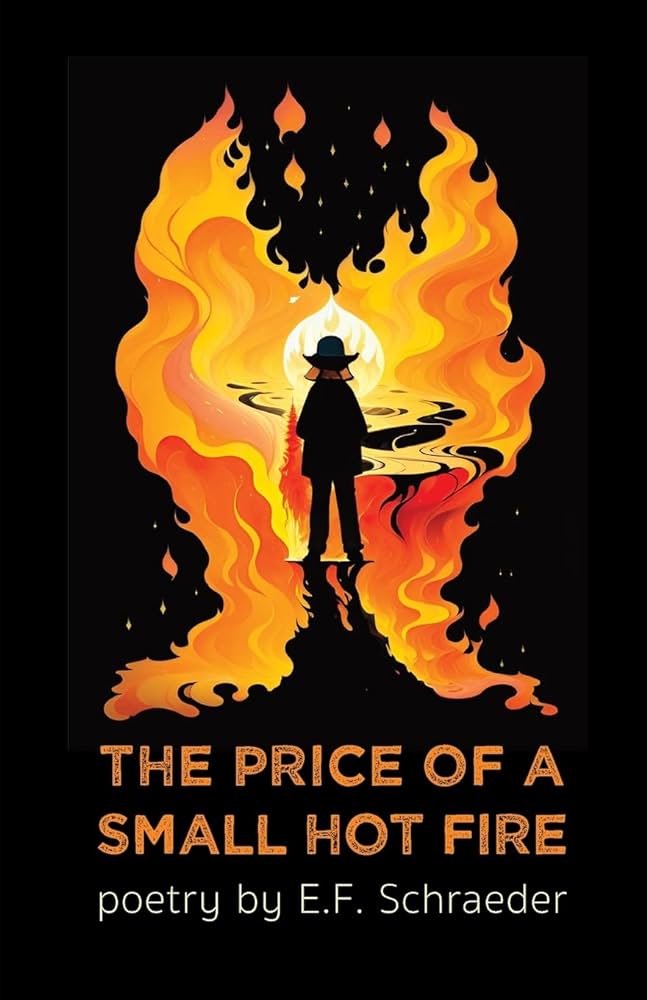Review of The Price of a Small Hot Fire by E.F. Schraeder

The Price of a Small Hot Fire
E.F. Schraeder
Raw Dog Screaming Press, 2023, 106 pages
$13.95
Reviewed by Yeva Johnson
I looked forward to reading E.F. Schraeder’s The Price of a Small Hot Fire, but when I read the author’s note, I stopped short. Horror poetry gives me pause. I love poetry, but I am one of those people who do not like horror, whether in film or written variety. I am haunted for years after any encounter with this artistic form, so I have been careful to curate and limit my exposures. While intellectually I knew that, as E.F. Schraeder says, “Horror poetry, like other horror media, provides a path to explore what frightens us with a distance that affords safety,” I am always spooked because I understand all too well that “Whether understated or blood-soaked, a horror poet’s personal take and artistic license may yield an intensity of pitch or punch that offers unusual or uncomfortable discovery.” It was an act of bravery for me to dive into Schraeder’s poetic world without rules, where no topic was off limits. Luckily, my bravery was handsomely rewarded.
The Price of a Small Hot Fire is E.F. Schraeder’s first full-length poetry collection, and they supply us with a panoply of poems in various forms with interlocking and overlapping themes replete with images of spells, witches, knives, hearts, fires, lions, Frankenstein, Narnia, stones, bone, wind, water, and ash that underlie a queer feminist take on mothers, estrangement, trauma, and grief. In the poem “Postmarked From Nowhere,” Schraeder taps into the particular sources of fear that writers and poets experience when a mother character serves as a metaphor for how our lives are marked by others, in lines like “She inserted commas into adolescence / until I craved erasers and disappearing ink.” In “Confessions of an Avon Lady’s Daughter,” the mother says, “I feel naked without makeup,” but in this kindhearted portrait, this same mother, when asked by the speaker to teach them how, replies, “No. I don’t want you to feel like that.” The poet repeatedly shares the pain of trauma with lines like “sliced into muscle with weights and blades” and the heady lack of fear at “the sensuous rush / of standing on the edge of cliff,” so it is only fitting that in a later poem Schraeder gifts us with the antidotal line “In the garden, I plant the cure for everything” to assuage our tender nerve endings.
In another poem, the poet reminds us that a mother is not wholly a monster with the tender lines “I leapt over each sidewalk crack / my youth spent on checkerboard moves / in the chess of childhood / where I always lost.” But, this is a horror collection, and one of the most horrifying poems is “Necessary Tools for the Reinvention of a Relationship,” where Schraeder transforms everyday objects into suppliers of fear and danger, so that “One crystal vase” will forever terrify me. “Cherry Blossoms (Mourning A Distant Mother)” captures the essence of estrangement and loss: “No one else grieves what’s always been gone.” By the time the reader comes to the poem “Forgiveness Spell” they are ready to ponder all the dimensions of Schraeder’s question, “Is loss so different than love?” Schraeder never drifts into the overly sentimental, but rather weaves layers upon layers of meaning within and between lines that pack a punch.
Whether or not one is a fan of horror, poetry, both, or neither, The Price of a Small Hot Fire is well worth reading and reading again. This insightful collection of horror verse leaves us ruminating on every mother, every fire, every fear, every love, allowing us to reflect and so be nurtured by Schraeder’s work. Read The Price of a Small Hot Fire, and you will likely find yourself agreeing with E.F. Schraeder when they say “Life is full of poetry and horror. It’s up to any of us how closely we choose to look.”
Yeva Johnson, a Pushcart Prize-nominated poet and musician whose work appears in Bellingham Review, Essential Truths: The Bay Area in Color Anthology, Sinister Wisdom, Yemassee, and elsewhere, explores interlocking caste systems and possibilities for human co-existence in our biosphere. Her debut poetry chapbook, Analog Poet Blues, is available at Black Lawrence Press.
"Empowerment comes from ideas."
― Charlene Carruthers
"Your silence will not protect you."
— Tourmaline
"Gender is the poetry each of us makes out of the language we are taught."
— Leila Raven


